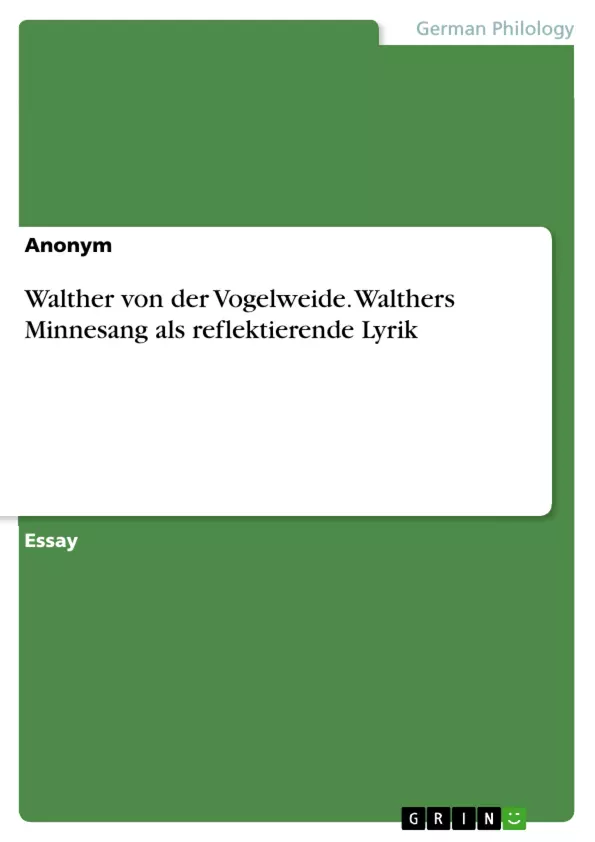Unfortunately, today we do not know much about the lecture situation and the meaning with the identical real author. Elisabeth Lienert, however, creates by approaching the author through her internal singing role. Because: ‘Methodisch sind autopoetische Aussagen des Sängers [...] Kunstaussagen auf der Ebene der liedinternen Rollen, [die] nicht mit Autoraussagen gleichzusetzen [sind]‘ (Lienert 115). Lienert argues that there are no direct author statements in Minnesang, but rather that one could speak of the author aspect of the singer role (Lienert 116). In their opinion, author and lecturer coincide in the singer-ego, unless the motif of the song is the lecture to a lover by a messenger or the courted lady herself reads the message conveyed to her. Lienert takes the view that the author usually disappears behind the performer, leaving traces at best in so-called 'author-specific characteristics' resulting from the characterization and design of the singer roles (Lienert 118). Therefore, it is now necessary to discover the roles through which Walther lets his ‘lyrisches Ich’ speak. There are roughly two types of roles. On the one hand, the role of the ‘Minnenden‘, the advertising I, and on the other hand, the role of the Singing I, for the one thing in relation to the service to the lady and on the other hand, in relation to the service to society. Moreover, both roles can also be related to each other.
Inhaltsverzeichnis (Table of Contents)
-
'Überhaupt ist Walthers Minnesang reflektierende Lyrik: das sprechende Ich räsoniert über die Minne, denkt über sein Leid und die Ursachen desselben nach, wägt ab, ringt um Erklärungen, setzt Grenzen.' Discuss.
- The 'lyrisches Ich' in Walther's Minnesang
- The Roles of the 'lyrisches Ich'
- The 'lyrisches Ich' in Under der Linden
- The 'lyrisches Ich' as a Mediator
- The 'lyrisches Ich' in Walther's Minnesang: Gender and Role Play
- The 'lyrisches Ich' and the Normative Author
Zielsetzung und Themenschwerpunkte (Objectives and Key Themes)
This text aims to discuss the nature of the 'lyrisches Ich' in Walther von der Vogelweide's Minnesang. It explores how this poetic persona embodies different roles and perspectives, reflecting the complexity of Walther's work.
- The multi-faceted nature of the 'lyrisches Ich' in Walther's Minnesang
- The interplay between author, singer, and speaker roles
- The use of gender-specific roles and perspective shifts
- The relationship between the 'lyrisches Ich' and the audience
- The role of the normative author in Walther's works
Zusammenfassung der Kapitel (Chapter Summaries)
- This chapter examines the concept of the 'lyrisches Ich' in Walther von der Vogelweide's Minnesang. It explores how this poetic persona is not simply a reflection of the author, but rather a complex and dynamic construct that takes on various roles and perspectives.
- This chapter focuses on the roles that the 'lyrisches Ich' embodies in Walther's Minnesang. It distinguishes between the role of the 'Minnenden' (the lover) and the role of the Singing I, both in relation to the service of the lady and to society.
- This chapter analyzes the specific example of Walther's song "Under der Linden," demonstrating how the 'lyrisches Ich' can speak from the perspective of a woman. It examines the gender-specific roles and the implications for understanding the character of the 'lyrisches Ich'.
- This chapter explores the 'lyrisches Ich' as a mediator between the author and the audience, emphasizing how it acquires its expressiveness through the engagement of the recipient. It also discusses the use of deictic expressions and slogans, which provide insights into the poet's self-understanding and his art.
- This chapter examines how the 'lyrisches Ich' in Walther's Minnesang takes on various roles, including gender-specific roles and roles connected to the author's identity. It explores the interplay between the 'lyrisches Ich' and the normative author, demonstrating how Walther integrates himself into his own poetry.
Schlüsselwörter (Keywords)
This text focuses on key themes and concepts related to the 'lyrisches Ich' in Walther von der Vogelweide's Minnesang, including its multi-faceted nature, its role in mediating between author and audience, the use of gender-specific roles, and the relationship to the normative author.
Frequently Asked Questions
Who is the "lyrisches Ich" in Walther von der Vogelweide's poetry?
The "lyrisches Ich" (poetic I) is a complex construct within the song roles, not to be equated directly with the historical author Walther. It acts as a persona that reflects on love and society.
What are the different roles the poetic I can embody?
It primarily takes on the role of the "Minnenden" (the lover) or the "Singing I," serving either the lady or society through song.
Can the poetic I in Minnesang represent a female perspective?
Yes, in songs like "Under der Linden," the poetic I speaks from the perspective of a woman, demonstrating Walther's use of gender-specific role play.
How does the poetic I function as a mediator?
It serves as a bridge between the author and the audience, gaining meaning through the engagement and interpretation of the listeners.
What is a "normative author" in the context of Walther's work?
It refers to the traces of the author's specific characteristics and artistic self-understanding that remain visible behind the performer's role.
- Quote paper
- Anonym (Author), 2019, Walther von der Vogelweide. Walthers Minnesang als reflektierende Lyrik, Munich, GRIN Verlag, https://www.grin.com/document/535552



